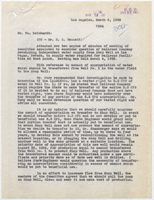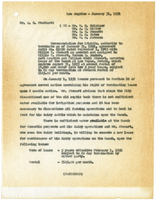Search the Special Collections and Archives Portal
Search Results

Letter from F. H. Knickerbocker and R. B. Robertson (Los Angeles) to C. R. Gray (Omaha), April 20, 1931
Date
Archival Collection
Description
Request for permission to begin construction on a water line to support Industrial Unit No. 1.
Text

Letter from Walter R. Bracken (Las Vegas) to F. H. Knickerbocker (Los Angeles) regarding water service for industrial sites, June 4, 1931
Date
Archival Collection
Description
Since the water company could not meter the water, Bracken would conduct a survey of the new users to try and determine how much water each will require so they could establish rates for them.
Text

Letter from E. E. Bennett (Los Angeles) to Calvin M. Cory (Las Vegas), December 22, 1950
Date
Archival Collection
Description
Discussion of the defeat of bills to overturn the metering prohibition and efforts to have a future bill passed. "80-8, 83-4, 80-5-Gen" written at head of page in red pencil.
Text

Letter from P. J. Lynch (Omaha) to A. E. Stoddard, March 13, 1952
Date
Archival Collection
Description
Lynch brings attention to the issue of the Union Pacific Railroad developing an independent water source. They had a well in the shop yard, but the only vested water right they had was in Well No. 1 near the Las Vegas Springs. The railroad needed a permanent solution.
Text

Letter from R. L. Adamson (Los Angeles) to William Reinhardt, March 6, 1952
Date
Archival Collection
Description
Discussion about transferring the 2.5 CFS granted to the Union Pacific Railroad company from Well No. 1 to the shop well, and increasing the capacity of the well to produce that amount.
Text

Letter from Hugh A. Shamberger (Carson City) to Colonel H. F. Clark (Las Vegas), December 11, 1951
Date
Archival Collection
Description
Shamberger advised the Water District to purchase the lands surrounding the Las Vegas Springs as well as other springs and wells in the area to protect its water sources in the future.
Text

Letter from A. M. Folger (Las Vegas) to Frank Strong, February 21, 1948
Date
Archival Collection
Description
Discussion of drilling two wells on the Las Vegas Ranch to make up for the irrigation water lost by the City forbidding the use of effluent, and of giving up acreage for the Elks and a sewer treatment plant.
Text

Letter from A. M. Folger (Las Vegas) to William Reinhardt, November 17, 1950
Date
Archival Collection
Description
Lessees of the Las Vegas Ranch quit paying their rent when the water to the ranch quit flowing. Upon being reminded of the terms of the lease, they paid the rent, but asked for future water delivery plans.
Text

Letter from William Reinhardt (Los Angeles) to A. E. Stoddard, January 31, 1951
Date
Archival Collection
Description
Willie T. Stewart was terminating the lease due to insufficient water on the ranch. He was willing to sign a new lease given the listed terms. Letter refers to outlined areas noted on map referenced below.
Text

Letter from Howard W. Cannon (Las Vegas) to W. H. Johnson (Las Vegas), April 17, 1951
Date
Archival Collection
Description
The irrigation practices on the Las Vegas Ranch were being blamed for the mosquito problem in Las Vegas, and the Las Vegas Land and Water Company was being asked to address it.
Text
